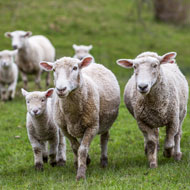
Farmers urged to be vigilant for signs of the disease
Sheep farmers are being urged to test their flocks for Maedi Visna (MV), after vets reported a sharp rise in cases in the Scottish Borders over the past 12 months.
The calls came during a meeting of the Borders Monitor Farm last week.
Speaking at the meeting, vet Andrew Robinson from Hawick Vets said that after seeing almost no cases for a long period of time, the practice diagnosed MV in a commercial flock in February last year. Since then it has seen several other cases over the past few months.
“I think MV is seriously under diagnosed so we have no idea how many flocks are infected in this area,” he added. “We really need to know the true incidence so that we can advise farmers how to control and eradicate it. We would strongly encourage farmers to test their flocks for MV.”
MV is a difficult disease to diagnose in flocks, owing to the variety of clinical signs. These may include a decrease in scanning percentage, reduced milk production in ewes (leading to slower growth rates in lambs), ill thrift, laboured breathing and increased risk of bacterial pneumonia infection and higher cull rates.
Caused by a retrovirus, MV is highly contagious and primarily spreads through nose to nose contact. It can also be transmitted via colostrum and milk, and there is a small risk of the virus passing through the placenta to unborn lambs, or venereally from ram to ewe. No vaccine or cure is available.
It is often referred to as an ‘iceberg disease’ as it can take years before infected sheep show symptoms, meaning the animals displaying clinical signs are just the tip of the iceberg’ of infected animals.
Lynn Gibson, manager of the MV Accreditation Scheme, explained: “Although sheep infected with MV can survive without showing any clinical signs for several years, they will be infectious and able to pass the virus onto other sheep in the flock.
“It’s therefore vital for farmers to try and establish if they have MV in their flock and determine how many animals are infected, so that they can discuss effective control options with their vet.”
Scotland’s monitor farm project, which is run by Quality Meat Scotland and AHDB Cereals & Oilseeds, has agreed to cover the costs of initial MV screening for 20 local flocks, to find out the extent of the problem in the area.



 The veterinary mental health charity Vetlife is inviting the veterinary community to join it for a sponsored cold-water dip.
The veterinary mental health charity Vetlife is inviting the veterinary community to join it for a sponsored cold-water dip.